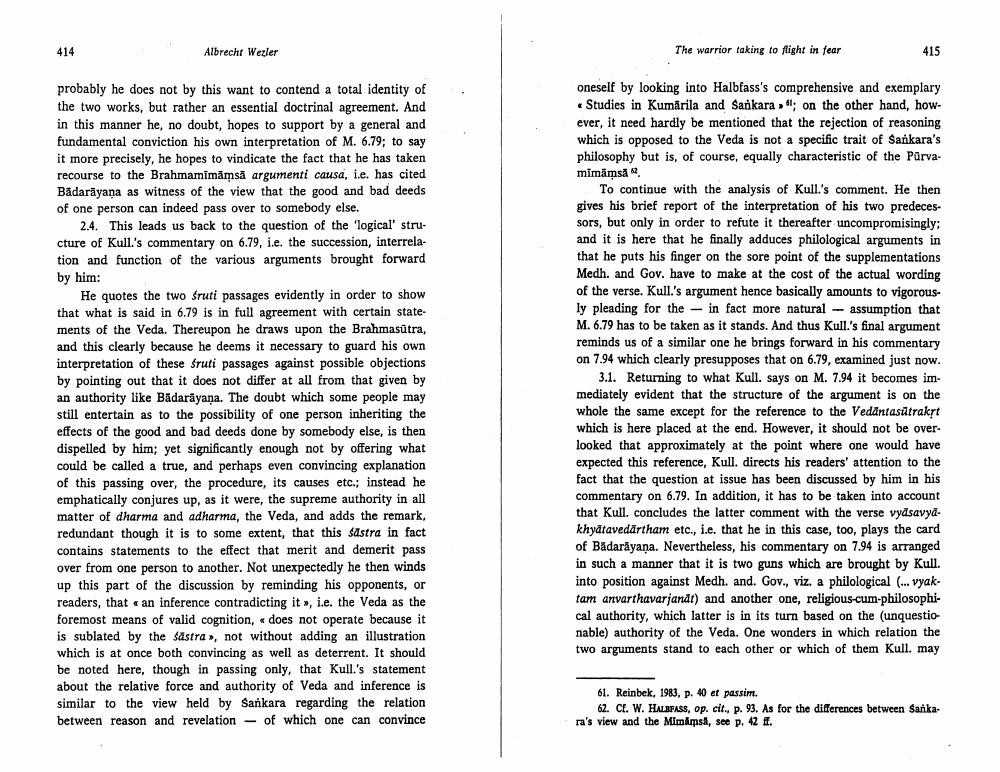________________
414
Albrecht Wezler
probably he does not by this want to contend a total identity of the two works, but rather an essential doctrinal agreement. And in this manner he, no doubt, hopes to support by a general and fundamental conviction his own interpretation of M. 6.79; to say it more precisely, he hopes to vindicate the fact that he has taken. recourse to the Brahmamimāmsă argumenti causa, i.e. has cited Badarāyaṇa as witness of the view that the good and bad deeds of one person can indeed pass over to somebody else.
2.4. This leads us back to the question of the 'logical' structure of Kull.'s commentary on 6.79, i.e. the succession, interrelation and function of the various arguments brought forward by him:
He quotes the two śruti passages evidently in order to show that what is said in 6.79 is in full agreement with certain statements of the Veda. Thereupon he draws upon the Brahmasutra, and this clearly because he deems it necessary to guard his own interpretation of these śruti passages against possible objections by pointing out that it does not differ at all from that given by an authority like Badarāyaṇa. The doubt which some people may still entertain as to the possibility of one person inheriting the effects of the good and bad deeds done by somebody else, is then dispelled by him; yet significantly enough not by offering what could be called a true, and perhaps even convincing explanation of this passing over, the procedure, its causes etc.; instead he emphatically conjures up, as it were, the supreme authority in all matter of dharma and adharma, the Veda, and adds the remark, redundant though it is to some extent, that this sastra in fact contains statements to the effect that merit and demerit pass over from one person to another. Not unexpectedly he then winds up this part of the discussion by reminding his opponents, or readers, that an inference contradicting it», i.e. the Veda as the foremost means of valid cognition,« does not operate because it is sublated by the sastra», not without adding an illustration which is at once both convincing as well as deterrent. It should be noted here, though in passing only, that Kull.'s statement about the relative force and authority of Veda and inference is similar to the view held by Sankara regarding the relation between reason and revelation 1 of which one can convince
The warrior taking to flight in fear
415
oneself by looking into Halbfass's comprehensive and exemplary Studies in Kumarila and Sankara»; on the other hand, however, it need hardly be mentioned that the rejection of reasoning which is opposed to the Veda is not a specific trait of Sankara's philosophy but is, of course, equally characteristic of the Pürvamimämsä 62
To continue with the analysis of Kull.'s comment. He then gives his brief report of the interpretation of his two predeces. sors, but only in order to refute it thereafter uncompromisingly; and it is here that he finally adduces philological arguments in that he puts his finger on the sore point of the supplementations Medh. and Gov. have to make at the cost of the actual wording of the verse. Kull.'s argument hence basically amounts to vigorously pleading for the in fact more natural assumption that M. 6.79 has to be taken as it stands. And thus Kull.'s final argument reminds us of a similar one he brings forward in his commentary on 7.94 which clearly presupposes that on 6.79, examined just now.
3.1. Returning to what Kull. says on M. 7.94 it becomes immediately evident that the structure of the argument is on the whole the same except for the reference to the Vedantasütrakṛt which is here placed at the end. However, it should not be overlooked that approximately at the point where one would have expected this reference, Kull. directs his readers' attention to the fact that the question at issue has been discussed by him in his commentary on 6.79. In addition, it has to be taken into account that Kull. concludes the latter comment with the verse vyāsavyākhyātaveḍārtham etc., i.e. that he in this case, too, plays the card of Bădarāyaṇa. Nevertheless, his commentary on 7.94 is arranged in such a manner that it is two guns which are brought by Kull. into position against Medh. and. Gov., viz. a philological (... vyaktam anvarthavarjanat) and another one, religious-cum-philosophical authority, which latter is in its turn based on the (unquestionable) authority of the Veda. One wonders in which relation the two arguments stand to each other or which of them Kull. may
61. Reinbek, 1983, p. 40 et passim.
62. Cf. W. HALBFASS, op. cit., p. 93. As for the differences between Sankara's view and the Mimämsä, see p. 42 ff.




